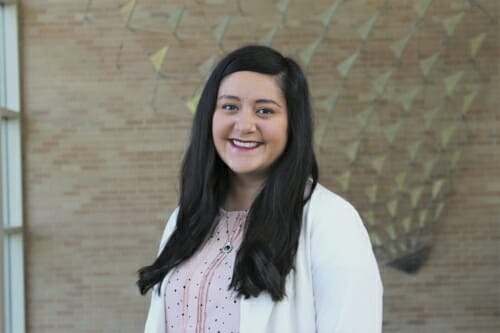New Faculty Focus: Marina Maes
Marina L. Maes, Assistant Professor, Pharmacy Practice Division, School of Pharmacy
Hometown: Thornton, CO
Educational/professional background: B.S. Medical Science, University of Colorado, 2015;
PharmD – University of Colorado, 2017; PGY1 Pharmacy Practice Residency – University of Michigan, 2018; PGY2 Ambulatory Care/Family Medicine Specialty Residency – University of Colorado, 2019.
How did you get into your field of research? During pharmacy school, I recognized how impactful pharmacists could be in the clinic setting through an internship that I completed in primary care. After pharmacy school, I went on to complete two years of post-graduate residency training in which I specialized in ambulatory care with a focus in family medicine. What I love about family medicine is the strong team-based integrated approach in caring for the whole patient in a world of healthcare that is specialty focused. As a family medicine pharmacist, I focus on optimizing health outcomes through using medications effectively and safely among a wide array of chronic and acute diseases. Additionally, my practice focuses on educating pharmacy learners, patients and caregivers, and other members of the healthcare team. My research interests integrate chronic disease management and education and my specific interests are in women’s health and cardiovascular risk reduction.
What attracted you to UW–Madison? UW–Madison is nationally recognized as a top-tier institution in all areas that I am passionate about: pharmacy education, family medicine, and clinical research. As someone who is entering my first position post-residency training, I wanted to be in an environment that would foster my professional growth. There are SO many experienced individuals both within and outside of the School of Pharmacy at UW–Madison that I know will be exceptional mentors and collaborators.
What was your first visit to campus like? FREEZING. Literally. The lakes were covered in snow, and I had never been so cold (even coming from Colorado!). Moving to Madison in the summer though has been such a pleasant surprise.
What’s one thing you hope students who take a class with you will come away with? When I teach, I want my students to be able to build a connection between the content/skills being taught and its applicability to patient care. While there are many career paths that can be taken as a pharmacist — retail, hospital, managed care, research, industry, governmental, and more — the ultimate goal is to improve health of patients. I believe that this patient-centered mindset will not only allow students to retain what they have learned in the short-term but will also make them exceptional future pharmacists in the long-term.
Do you feel your work relates in any way to the Wisconsin Idea? If so, please describe how. Absolutely! The goal of my clinical work is to directly improve the health and quality of life for patients with a direct impact on the citizens of Wisconsin through optimizing the use of medications. Additionally, I feel like my reach is exponential through my indirect contributions in educating future healthcare practitioners and through dissemination of knowledge through future research findings.
What’s something interesting about your area of expertise you can share that will make us sound smarter at parties? An aspirin a day does not necessarily keep the doctor away. While daily aspirin is indicated in some patients (e.g., patients with history of heart attack or stroke), newer data suggests that daily aspirin (even baby-dose) may do more harm than good in other patients!
Hobbies/other interests: Broadway theater, cheering on Denver sports teams, and finding new coffee shops
Learn more about Dr. Maes’ pharmacy practice and research.

